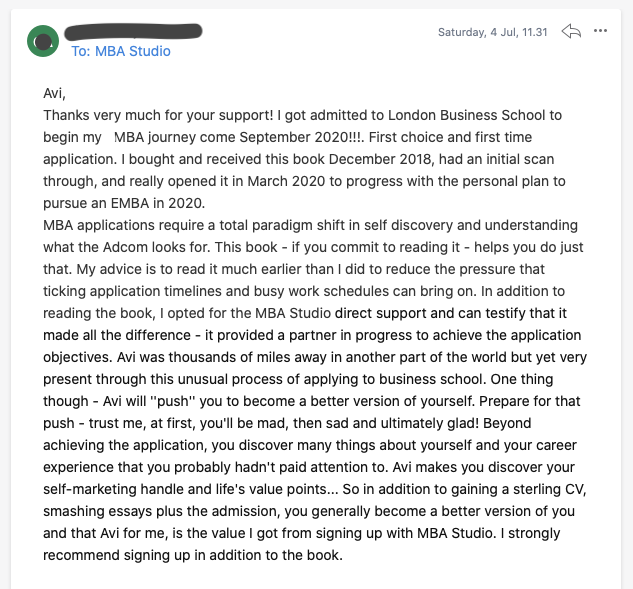If you look back through the 10-year archive of posts here on this site, and see my book, you’ll know I’ve written many times on how to write a winning MBA admissions essay.
There’s no formula. But as we look ahead to a new admissions season, some particular issues come to mind when I look at the current crop of essays I’m reviewing and advising on for clients.
What is a good essay?
One may think, there are many kinds of good. Who’s to say? Beauty is in the eye of the beholder, etc. Actually, not so. For MBA admissions, a good essay is one that gets the applicant admitted. Period.
(On the other hand, being dinged doesn’t mean you wrote a bad essay. It’s ultra-competitive out there.) But getting in does mean you wrote a winning essay.
How to win?
1. Be authentic. This doesn’t mean you are not also strategic in your communications choices. But if strategic is all you are, if there is not a real voice speaking, your essay will not have enough natural vitality, personality and drive. Be you, and only you, not what you imagine some ideal MBA applicant should be.
2. Don’t talk business-speak. As a sidebar to the authentic imperative, don’t wrap your distinct self in jargon. If your text talks about how you achieved ‘synergies’ based on ‘actionable’ ‘imperatives’ that ‘drove’ a ‘frictionless’ process ‘taking it to the next level’… that’s not the real you speaking. For authenticity, just use standard English words in the normal way.
3. Show don’t tell. Any claim you make about yourself is hot air unless you can prove it with a verified achievement, or clear example, or believable story. This is where the evidence for your positive self-assessment lies, and this is where Adcom will look.
4. Write brightly. It’s dull to read dull or generic text. One essay, fine; two, bleugh; three, sigh; four, pass the vodka. You will stand out if you make your points crisply and move the reader forward at a good pace.
5. Lead the reader. You are guiding your reader not trying to set her a comprehension test. So don’t stint on structure. Use signposting and paragraphing to signal where you are going, which should be along a path that already naturally makes sense. (Then go where you said you would.)
6. Delete redundant staging. Signposting is good, but after that, don’t launch your points with extra padding like: “In this essay I aim to create an understanding for the admission committee with regard to a greater knowledge of my professional aspirations.” Delete all that, and just say what your aspirations are. Make space for real content.
7. It’s about you. Avoid telling the school how great it is, or how great the opportunities it will give you are. They are aware of their status. The question is, are you great? Will you use the opportunities to do great things. If so, how so?

